Why is it taking so long to improve Ely North junction?
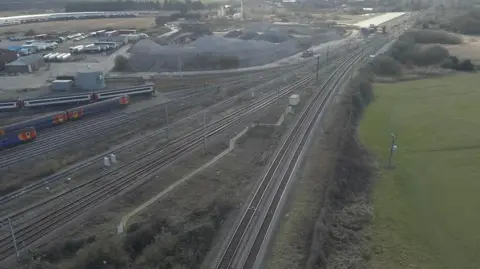 Mark Dodd/BBC
Mark Dodd/BBCThere are dozens of rail schemes waiting for government funding but few have had their hopes raised and then dashed as often as Ely North junction.
For 25 years campaigners have argued that improving it would make it possible to run more freight and passenger services and help grow the local economy.
But despite the project getting the go-ahead from previous governments on at least two occasions, the work is yet to start.
Rising costs, complicated engineering and a slowness to make decisions are being blamed.
With the government about to publish its 10-year infrastructure strategy, there are hopes that the project will make it on to this list for funding. But why is it taking so long?
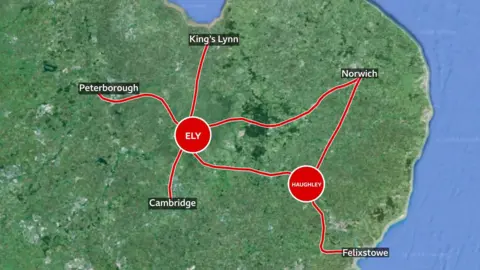
Lines from Norwich, Cambridge, King's Lynn, Peterborough and Ipswich all meet at Ely North junction.
People first started talking about improving the junction back in 2000.
By 2011 the politicians were involved with the South West Norfolk MP Liz Truss bringing together local councils and business leaders.
Since then, there have been numerous meetings, reports written and several ministerial visits to Ely station.
The argument has never really changed: extra track and improved signalling would lead to an increase in services, encouraging more passengers to use the train and take thousands of lorries off the road.
So why has nothing happened?
Engineering challenges
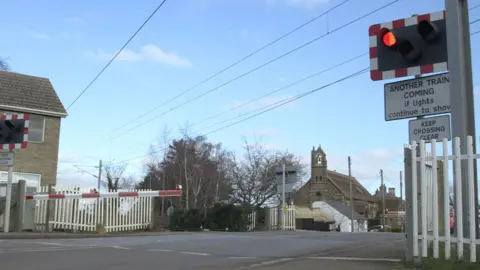
The more you study the problem, the more complicated it becomes.
"Ely isn't called the Isle of Ely for nothing," says Charlotte Cane, the local Liberal Democrat MP.
"It is surrounded by wetland, making the soil difficult to build heavy infrastructure on. But we know how to do it; it just needs commitment and money"
And that isn't the only problem.
"The B1382 Ely and Prickwillow Road is another serious sticking point" says Chris Burton from lobbying group Rail Future.
"It crosses the line to Norwich, the line to King's Lynn and the busiest line to March and Peterborough.
"Local people already keep getting caught at the [three] level crossings and it will be even worse if they start running more trains.
"There is no space to put a bridge in so you will need another project to get the road out of the way of the railway."
It is these obstacles that have driven up the estimated cost of improving the junction to £0.5bn.
Treasury delays
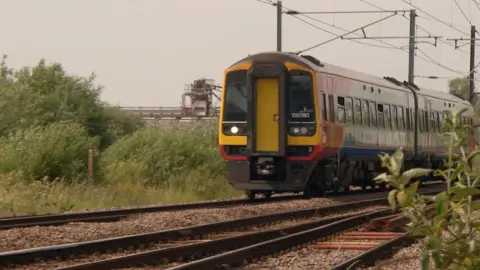 Martin Giles/BBC
Martin Giles/BBCThe longer the project is delayed, the more the cost goes up.
"Every new government or [rail] minster wants to look at everything again," says Cane.
"You do a business case under one set of criteria and then, five years later, you're asked to do a business case under another set of criteria.
"Governments need to be less fixated on making new announcements which are their announcements, and more willing to continue things that have already been started."
There is also a fear that the Treasury is reluctant to commit money to the scheme.
"I think we have been making enough noise and making the best case that can be made, but Ely never seems to glow well enough in the political spectrum to move itself up the list," says Mr Burton.
He says rail schemes linking bigger conurbations in other parts of the country, particularly the north, seem to get funding more easily.
He wonders if governments think too much about seats that could be under threat at the next election when they allocate cash.
James Palmer, the former Conservative Mayor of Cambridgeshire and Peterborough, and now chair of the Eastern Powerhouse lobbying group, is more damning.
"The Treasury does not look at infrastructure as a way of bringing growth," he says.
"They just look at it as a cost to the Treasury. They don't particularly care if you say to them 'Build this infrastructure and it will bring you economic growth over a sustained period and therefore give you more money.'"
Treasury insiders insist that every scheme is judged on its economic merit and the benefits it can bring to the economy.
What next?
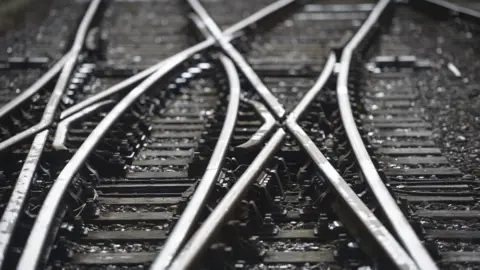 Getty Images
Getty ImagesNetwork Rail was given £13m by the government in 2020 to develop options for the junction and prepare an outline business case.
It says the report was submitted to the Department for Transport (DfT) in 2022 and is awaiting a decision.
The DfT was given extra money for capital projects in last week's spending review. It has already announced £6.4bn for East West Rail between Oxford and Cambridge and more announcements are expected soon.
Labour MPs insist that the government understands the importance of Ely and remain confident that it will soon receive funding.
But even if it does, producing a new business case, finding a solution to the B1382 issue, applying for planning permission, acquiring land and then actually doing the work means that it is likely to be the best part of a decade before Ely North junction is improved.
